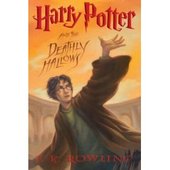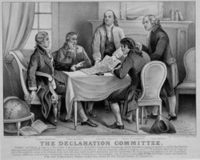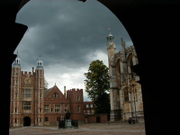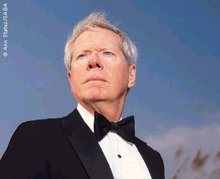
With today’s delivery of Harry Potter and the Deathly Hallows, the final installment of J.K. Rowling’s epochal story of growing up, the time has come to reveal the true magic of Harry Potter.
Any sufficiently advanced technology is indistinguishable from magic.
Were the Drafting Committee of the Second Continental Congress to pause from their labors of writing a Declaration and appear on your doorstep tomorrow, there is no doubt they would find you, and me, all of us to be mighty wizards indeed.
Everything we take for granted — television, recordings, telephones, air conditioning, planes, trains and automobiles, this medium you’re using — was unimaginable in 1776. And not just the obvious.
- Most carrots were not orange in 1776.
- Portland cement was invented in 1824.
- Flush toilers did not come into common use until the late 19th century.
- The first American oil well was drilled in the 1820s.
- The germ theory of disease had not been thought of in the 18th century.
The very idea of doctors needing cleanliness was unimaginable. This would nearly kill Adams himself during the great Philadelphia Flu epidemic of 1793.
Yet these were wise men, among the wisest of their time. I’m certain
Benjamin Franklin would quickly get used to us. He would devour our
science and try to take apart everything. Thomas Jefferson would marvel at
our kitchens, baths, showers, and how all of these were available even
to the poorest among us. John Adams’ nose would twitch, he’d cough and
splutter, at all the dirt in the air, the strange foul smells
assaulting him at every turn. I suppose Roger Sherman and Robert
Livingston would just stare — the Connecticut of Sherman’s time was
the colonies’ breadbasket, and the New York Stock Exchange in
Livingston’s New York wasn’t founded until 1792.
What wizards we would be to them. And that’s the point of Rowling’s saga.
Hogwarts is a stand-in for Eton, one of the great English institutions where
the best and brightest young children are transformed, over the course of 7 hard years, into
young men and women ready to step in and lead this highly complex,
technological, scientific, magic society. The lessons of Eton — history,
literature, science, mathematics — combine with the greater magic of growing-up to affect this great change.
And it does not just happen there. It happens in hundreds of thousands
of places around the world. We have a name for it — education. The miraculous process of becoming an
adult, which for a century we have disdainfully called adolescence, is
in fact an amazing, magical journey for everyone who partakes in it. It
is both an opportunity and an obligation to learn, to find the magic
which best suits you and to master it.
You might find your magic in English, in music, in chemistry, in mathematics, in
biology, in engineering, in the majesty of the law or the mysteries of
medicine. You might find it in computer programming. You might, if you’re fortunate, find it in teaching.
You go into a room, you stay there a very long time, and if
you work hard you come out with knowledge, with special wisdom those
around you do not possess. What else can that be but magic?
This is real wizardry, the ability to create new miracles in
nanotechnology, in biological sciences, or in any number of disciplines
that have not yet been imagined. Nanotech, for instance, did not exist
when I went to school. I was also taught that dinosaurs were extinct and
most closely related to reptiles. I had no PCs, no CDs, when I was
coming up. All these inventions, and so many more, were imagined, then
created, by great wizards and engineers after I came out of high school.
So I ask each child who may stumble upon this meager offering, what
magic will you create? I ask their parents, what magic will you let
them learn?
To those fools
who think Harry Potter encourages people to become wizards and witches,
I say that without them we could never have civilization. Without the
magic of learning, and teaching, we are animals. Reject the magic all
around you and you reject your own humanity. 
You, there. Yes, you. Your hair, your make-up, that shirt you’re wearing, that microphone
you’re talking into, the camera you’re speaking to, the road you drove
in on, if your great-great-great-great-great-grandmother came from 1776
and took one look at you, she would call you a witch. And she would be
right.
You don’t really want to give up your magic. You just want to pretend that’s all it is. I guess that’s what being a Muggle is all about.












Portland(tm) cement was indeed invented quite late–but neither cement nor concrete are “new” inventions. Both were in use early in the history of the Roman Empire–although underwater concrete & cements were “lost” technologies for many hundreds of years.
While many things today would greatly impress our forefathers, many would be quite familiar in their use, if not their forms.
Every cooking method up to microwaves, would be easy for anyone in recorded history to learn to use, as they are all similar to fire.
Automobiles (even automated ones) would be easy for anyone used to animal powered vehicles to learn to use–and not difficult for those who only had human muscle.
While oil wells are new, the use of generic oil for heat and light preceeds written history. The ways we actually use oil would be easy for anyone in history to understand–with the possible exception of plastics.
Electronics would be difficult for most to understand–but most modern people don’t understand electronics–but they can learn to use them.
Electrical lighting would (with the exception of LED’s) be quite understandable to any natural philosopher of 1776–once it was explained.
Similarly, an intelligent person of the period would be able to have most consumer electrical or electronic devices explained easily–at least to the point that they would successfully be able to use them.
What would be a problem would be the sheer number of such devices. And that would present a problem even for intelligent people from 50-60 years ago. Heck, it’s a major problem for people who are institutionalized for more than a couple of years.
The physical devices and tools are not nearly the problem that explaining the cultural differences would present.
Take a person out of 1967 and tell them how you go about taking an airplane trip, and they would be appalled that you are required to submit to a search, forbidden to carry weapons, and required to present a valid passport to exit the country–they would naturally assume upon hearing such things that the USSR had successfully taken over the country.
In 1977 very, very few regular people would understand why anyone other than governmental and large corporations, would want their own computer. (I know, I did, and constantly tried to explain that desire to ordinary people.)
Our forefathers would be appalled at the existence of income taxes–which were illegal under the constitution. But a gas stove would present no difficulties, and even TV would not be hard for them to use (most people successfully use all of the major inventions without any real understanding of how they work.)
It would take Ben Franklyn a couple years to be ready for college (and he’d be appalled that his classmates didn’t know Latin, Greek, French or have a good grasp of classical Greek philosophers. He would probably be able to finish an electrical engineering degree in less than average time (he would, after all, be able to test out of most humanities courses and many of the early math courses.)
He’d also probably be a rebellious student devoting a lot of time to partying. He would be particularly happy with the changes in women’s styles, and probably with the equality that they have attained (such as it is) within our society.
The wide acceptance of consumer debt would appall most of our forefathers, as would the nearly zero savings rate in the US. They would recognize this combination as a sign of a failing society.
Government debt levels would clinch that observation.
Most people’s practical definition of “magic” amounts to an apparent “something for nothing.”
True magic users through out history have understood that the major functional aspect of most magic involves the _intent_ of the user. Focused intent, combined with persistence, can accomplish seemingly impossible feats.
Similarly, recognition of something as being “impossible” ensures that you will never accomplish it.
Portland(tm) cement was indeed invented quite late–but neither cement nor concrete are “new” inventions. Both were in use early in the history of the Roman Empire–although underwater concrete & cements were “lost” technologies for many hundreds of years.
While many things today would greatly impress our forefathers, many would be quite familiar in their use, if not their forms.
Every cooking method up to microwaves, would be easy for anyone in recorded history to learn to use, as they are all similar to fire.
Automobiles (even automated ones) would be easy for anyone used to animal powered vehicles to learn to use–and not difficult for those who only had human muscle.
While oil wells are new, the use of generic oil for heat and light preceeds written history. The ways we actually use oil would be easy for anyone in history to understand–with the possible exception of plastics.
Electronics would be difficult for most to understand–but most modern people don’t understand electronics–but they can learn to use them.
Electrical lighting would (with the exception of LED’s) be quite understandable to any natural philosopher of 1776–once it was explained.
Similarly, an intelligent person of the period would be able to have most consumer electrical or electronic devices explained easily–at least to the point that they would successfully be able to use them.
What would be a problem would be the sheer number of such devices. And that would present a problem even for intelligent people from 50-60 years ago. Heck, it’s a major problem for people who are institutionalized for more than a couple of years.
The physical devices and tools are not nearly the problem that explaining the cultural differences would present.
Take a person out of 1967 and tell them how you go about taking an airplane trip, and they would be appalled that you are required to submit to a search, forbidden to carry weapons, and required to present a valid passport to exit the country–they would naturally assume upon hearing such things that the USSR had successfully taken over the country.
In 1977 very, very few regular people would understand why anyone other than governmental and large corporations, would want their own computer. (I know, I did, and constantly tried to explain that desire to ordinary people.)
Our forefathers would be appalled at the existence of income taxes–which were illegal under the constitution. But a gas stove would present no difficulties, and even TV would not be hard for them to use (most people successfully use all of the major inventions without any real understanding of how they work.)
It would take Ben Franklyn a couple years to be ready for college (and he’d be appalled that his classmates didn’t know Latin, Greek, French or have a good grasp of classical Greek philosophers. He would probably be able to finish an electrical engineering degree in less than average time (he would, after all, be able to test out of most humanities courses and many of the early math courses.)
He’d also probably be a rebellious student devoting a lot of time to partying. He would be particularly happy with the changes in women’s styles, and probably with the equality that they have attained (such as it is) within our society.
The wide acceptance of consumer debt would appall most of our forefathers, as would the nearly zero savings rate in the US. They would recognize this combination as a sign of a failing society.
Government debt levels would clinch that observation.
Most people’s practical definition of “magic” amounts to an apparent “something for nothing.”
True magic users through out history have understood that the major functional aspect of most magic involves the _intent_ of the user. Focused intent, combined with persistence, can accomplish seemingly impossible feats.
Similarly, recognition of something as being “impossible” ensures that you will never accomplish it.